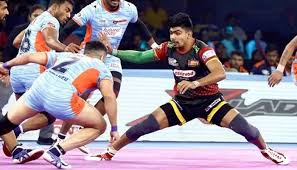Kabaddi, a traditional Indian sport with ancient roots, has experienced a remarkable revival in recent years, evolving from a rural pastime to a professional league with a growing global following. This transformation has not only reinvigorated the sport but also brought it into the mainstream, attracting new audiences and creating opportunities for athletes.
Kabaddi, believed to have originated in ancient India, has been played for centuries in villages across the country. The game is a test of physical strength, agility, and strategy, involving two teams competing to tag or tackle opponents while holding their breath. Despite its popularity in rural areas, kabaddi struggled to gain recognition on the national and international stage for much of the 20th century.
The turning point for kabaddi came with the launch of the Pro Kabaddi League (PKL) in 2014. Inspired by the success of franchise-based sports leagues like the Indian Premier League (IPL) in cricket, the PKL introduced a professional structure to kabaddi, with city-based teams, celebrity owners, and a well-organized tournament format. The league’s success was immediate, with high television ratings, packed stadiums, and a surge in the sport’s popularity.
The PKL has played a crucial role in modernizing kabaddi while preserving its traditional elements. The league has brought professionalism to the sport, offering players competitive salaries, sponsorship deals, and the opportunity to become household names. It has also attracted international players, adding a new dimension to the competition and broadening the sport’s appeal.
The revival of kabaddi has had a significant impact on the sport’s grassroots development. Schools and academies across India are increasingly focusing on kabaddi, providing training and facilities to nurture young talent. The sport’s resurgence has also led to the establishment of kabaddi leagues and tournaments in other countries, particularly in Asia, where it has a long-standing cultural presence.
Kabaddi’s popularity extends beyond India’s borders, with the sport gaining traction in countries like Iran, Bangladesh, and South Korea. The inclusion of kabaddi in international events such as the Asian Games has further boosted its profile, providing a platform for players from different countries to showcase their skills on the global stage.
The success of the PKL and the growth of kabaddi as a professional sport have also had broader cultural implications. The sport has become a source of national pride, with kabaddi stars emerging as role models for young athletes. The sport’s revival has also contributed to a renewed interest in traditional Indian games, highlighting the importance of preserving and promoting the country’s cultural heritage.
As kabaddi continues to grow and evolve, the future looks bright for this ancient sport. The combination of tradition and modernity, along with the support of passionate fans and a professional league structure, ensures that kabaddi will remain a vibrant and dynamic part of India’s sporting landscape for years to come.
